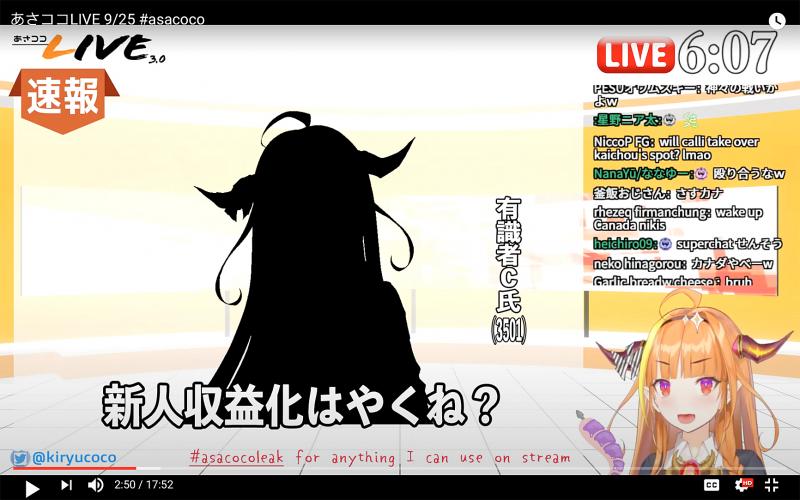Two Japanese virtual YouTubers (VTubers) were suspended by their employers on Sunday after mentioning Taiwan and showing the national flag during a livestream, stoking controversy that was inflamed further when it was discovered that their management company issued distinct apologies in Japanese and Mandarin.
While reading YouTube analytics over livestream on Thursday and Friday last week, Hololive VTubers Kiryu Coco and Akai Haato named Taiwan as contributing a high percentage of viewers.
Users on the Chinese video streaming platform Bilibili were quick to criticize the two and report their accounts, prompting Hololive’s parent company, Cover Corp, to suspend the streamers for three weeks until Oct. 19.

Photo: screengrab from YouTube
In its Japanese statement, which was also translated into English, Cover cited “divulging confidential YouTube channel analytics information” and “using said data for their own purposes” as reasons for the suspensions, in addition to making statements “that were insensitive to residents of certain regions.”
It also vowed to improve “compliance training” for its talent, although it added that it did not find either to have acted deliberately.
The firm posted a separate statement in simplified Chinese on Hololive’s Bilibili channel in addition to a translation of the original statement apologizing for its “incorrect content” and adding that the incident does not reflect the views of the company.
“Cover has always respected Chinese sovereignty and territory ... and resolutely supports the one China principle,” the statement said.
The absence of “one China” from the Japanese version did not escape the attention of Chinese Internet users, who have left more than 1.8 million comments on the two statements and are calling for a boycott of the company’s other channels.
Cover’s suspension of the entertainers angered other netizens, who denounced the company via comments and memes.
“So you really want to give up the rest of the world for China’s 0.02 percent market share? That’s just absurd,” one person wrote on Twitter.
Some threads discussing the incident on the official r/Hololive subreddit were removed, drawing more anger from fans.
The videos have been taken down from YouTube and Bilibili.
Hololive is one of the biggest agencies specializing in VTubers, or streamers who adopt a character persona and use an animated avatar instead of a video feed.
The company in November last year opened an account on Bilibili, where it has more than 4 million fans, Hololive said.

‘FORM OF PROTEST’: The German Institute Taipei said it was ‘shocked’ to see Nazi symbolism used in connection with political aims as it condemned the incident Sung Chien-liang (宋建樑), who led efforts to recall Democratic Progressive Party (DPP) Legislator Lee Kun-cheng (李坤城), was released on bail of NT$80,000 yesterday amid an outcry over a Nazi armband he wore to questioning the night before. Sung arrived at the New Taipei City District Prosecutors’ Office for questioning in a recall petition forgery case on Tuesday night wearing a red armband bearing a swastika, carrying a copy of Adolf Hitler’s Mein Kampf and giving a Nazi salute. Sung left the building at 1:15am without the armband and apparently covering the book with a coat. This is a serious international scandal and Chinese

PERSONAL DATA: The implicated KMT members allegedly compiled their petitions by copying names from party lists without the consent of the people concerned Judicial authorities searched six locations yesterday and questioned six people, including one elderly Chinese Nationalist Party (KMT) member and five KMT Youth League associates, about alleged signature forgery and fraud relating to their recall efforts against two Democratic Progressive Party (DPP) legislators. After launching a probe into alleged signature forgery and related fraud in the KMT’s recall effort, prosecutors received a number of complaints, including about one petition that had 1,748 signatures of voters whose family members said they had already passed away, and also voters who said they did not approve the use of their name, Taipei Deputy Chief Prosecutor

UNDER ATTACK: Raymond Greene said there were 412 billion malicious threats in the Asia-Pacific region in the first half of 2023, with 55 percent targeting Taiwan Taiwan not only faces military intimidation from China, but is also on the front line of global cybersecurity threats, and it is taking action to counter those attacks, President William Lai (賴清德) said yesterday. Speaking at the opening of this year’s Cybersec Expo in Taipei, the president assured foreign diplomats and exhibitors that Taiwan remained committed to strengthening its defense against cyberattacks and enhancing the resilience of its digital infrastructure. Lai referenced a report from the National Security Bureau (NSB) indicating that the Government Service Network faced an average of 2.4 million intrusion attempts daily last year, more than double the figure

COUNTERINTELLIGENCE TRAINING: The ministry said 87.5 percent of the apprehended Chinese agents were reported by service members they tried to lure into becoming spies Taiwanese organized crime, illegal money lenders, temples and civic groups are complicit in Beijing’s infiltration of the armed forces, the Ministry of National Defense (MND) said in a report yesterday. Retired service members who had been turned to Beijing’s cause mainly relied on those channels to infiltrate the Taiwanese military, according to the report to be submitted to lawmakers ahead of tomorrow’s hearing on Chinese espionage in the military. Chinese intelligence typically used blackmail, Internet-based communications, bribery or debts to loan sharks to leverage active service personnel to do its bidding, it said. China’s main goals are to collect intelligence, and develop a